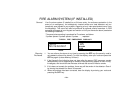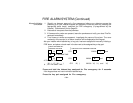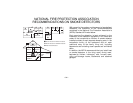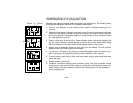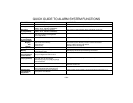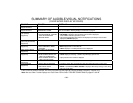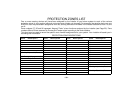
–43–
(continued) WARNING! THE LIMITATIONS OF THIS ALARM SYSTEM
• Alarm warning devices such as sirens, bells or horns may not alert people or wake up sleepers if they are located on the other side of
closed or partly open doors. If warning devices sound on a different level of the residence from the bedrooms, then they are less
likely to waken or alert people inside the bedrooms. Even persons who are awake may not hear the warning if the alarm is muffled
from a stereo, radio, air conditioner or other appliance, or by passing traffic. Finally, alarm warning devices, however loud, may not
warn hearing-impaired people or waken deep sleepers.
• Telephone lines needed to transmit alarm signals from a premises to a central monitoring station may be out of service or temporarily
out of service. Telephone lines are also subject to compromise by sophisticated intruders.
• Even if the system responds to the emergency as intended, however, occupants may have insufficient time to protect themselves
from the situation. In the case of a monitored alarm system, authorities may not respond appropriately.
• This equipment, like other electrical devices, is subject to component failure. Even though this equipment is designed to last as long
as 10 years, the electronic components could fail at any time.
The most common cause of an alarm system not functioning when an intrusion or fire occurs is inadequate maintenance. This alarm
system should be tested weekly to make sure all sensors and transmitters are working properly.
Wireless transmitters (used with some systems) are designed to provide long battery life under normal operating conditions. Longevity
of batteries may be as much as 4 to 7 years, depending on the environment, usage, and the specific wireless device being used.
External factors such as humidity, high or low temperatures, as well as large swings in temperature, may all reduce the actual battery
life in a given installation. This wireless system, however, can identify a true low battery situation, thus allowing time to arrange a
change of battery to maintain protection for that given point within the system.
Installing an alarm system may make one eligible for lower insurance rates, but an alarm system is not a substitute for insurance.
Homeowners, property owners and renters should continue to act prudently in protecting themselves and continue to insure their lives
and property.
We continue to develop new and improved protection devices. Users of alarm systems owe it to themselves and their loved ones to
learn about these developments.
SERVICING INFORMATION
Your local authorized service representative is the person best qualified to service your alarm system. Arranging a
regular program with that person is advisable. Your local service representative is:
NAME: _____________________________________________ PHONE: __________________________
ADDRESS: ______________________________________________________________________________
______________________________________________________________________________



